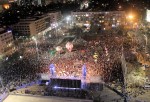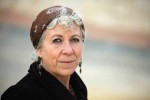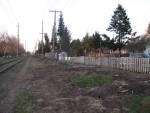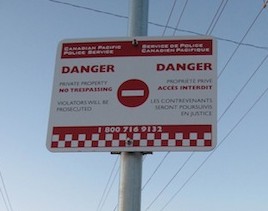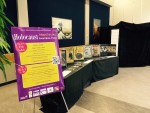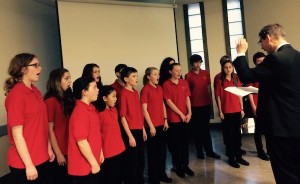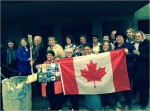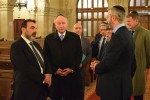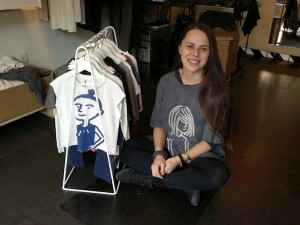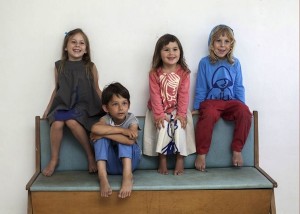Tens of thousands, at a rally in Rabin Square in Tel Aviv on March 7, call for Prime Minister Binyamin Netanyahu to be replaced in the upcoming elections. The rally, organized by a group called Million Hands, had as its keynote speaker the former head of the Mossad, Meir Dagan. (photo by Ashernet)
Expect surprises in Israel’s March 17 elections, say experts. “If there’s anything we’ve learned over the last decade, it’s that there’s going to be a surprise,” said Yohanan Plesner, a Kadima member of the Knesset from 2007 to 2013 and an aide to prime ministers Ariel Sharon and Binyamin Netanyahu. “Usually the surprise is somewhere in the centre.”
Now president of the Israel Democracy Institute, Plesner was speaking last week at the AIPAC conference in Washington, D.C.
Parties that have defied predictions in recent years include Shinui in 2003, Kadima in 2009 and Yesh Atid in 2013. No commentators are suggesting that any group other than Netanyahu’s incumbent Likud or the coalition of the Labor party and Tzipi Livni known as the Zionist Union will finish first and second. But what happens beneath these two leading contenders will determine who emerges as the country’s next leader.
Kulanu, a brand new party headed by Moshe Kahlon, is one to watch, said Plesner. Kahlon may be poised for a breakthrough because, among other factors, he is renowned for breaking up the cellphone monopoly in Israel, lowering prices for consumers.
The other person to watch, he said, is President Reuven Rivlin. The president may have an extraordinary role this time, despite the fact that the president usually has very little discretion in determining who will form government. But, in 2009, Plesner pointed out, Kadima won more seats than Netanyahu’s Likud, but Netanyahu became prime minister. A similar scenario could happen if the president, in consultation with the smaller parties, concludes that the leader with the second largest number of seats has the greatest chance of forming a relatively stable coalition.
The scenarios are complicated, Plesner said, by the fact that, although Rivlin was seen as the “Likud candidate” for president, Netanyahu did everything to prevent him from becoming president.
Plesner, who served as chief whip of a coalition government, said that “each party has its own hatreds within,” making coalition scenarios unpredictable. Agreements may not fall directly on ideological lines.
A national unity government of the two largest parties, he said, is something both leaders have ruled out which, he joked, means it might happen.
Also in the race is Avigdor Lieberman’s Israel Beteinu party, which began as a largely Russian movement but has expanded to welcome other voters with hawkish views.
Naftali Bennett’s Jewish Home party, which gets most of its support from the national religious movement and settlers, is still something of a force on the right, while Meretz, a dovish left-wing party could take a half dozen seats or so.
Yair Lapid, who leads Yesh Atid, a secularist upper-middle-class movement, is another leader who could benefit from last-minute movement among the 20 percent of voters who remain undecided, most of whom, Plesner said, are in the centre. Plesner senses that Lapid will gain momentum on social and economic issues including the cost of housing.
The ultra-Orthodox parties include United Torah Judaism, which is Ashkenazi, and Shas, which is Sephardi. Yachad, which is trying to unite modern Orthodox and ultra-Orthodox, is viewed as outside the mainstream because it includes members of the ultra-nationalist (Meir) Kahane movement.
In terms of issues, security is significant, but not because of deep divisions.
“There is little if any dispute around most of the security issues of Israel,” Plesner said. Therefore, it becomes mainly a question of competence. “Who do Israelis trust?” he asked. And who can generate trust with international allies?
Another issue is support for “remote settlements” beyond the security barrier, which could prove the dividing line between left and right, he said.
On the issue of a united Jerusalem, Plesner said this is an area of disparity between what politicians think and what they say. Most do not see the issue beyond symbolism, he said, but there is a significant chunk of municipal Jerusalem that is not symbolically significant. After 1967, a conglomeration of annexed neighborhoods far bigger than historical Jerusalem was brought into the municipality beyond the Old City and the “holy basin,” including refugee camps. The municipality now counts 300,000 residents of Israel who are not citizens.
This election, the threshold for getting into the Knesset has increased to 3.4 percent of the vote, meaning parties that do not achieve that level of support will not elect a single member. As a result, the Arab parties have banded together under a single umbrella with the hope that they will get some traction.
Arab Israelis have far lower voter turnout numbers than Jewish Israelis, but if Arabs increase participation, Plesner estimates that the Arab bloc could get as many as 14 or 15 seats, which would tip the balance between the left and right blocs. However, the Arab parties have said they would not join a coalition, though they could help the president select the next prime minister.
Natan Sachs, a foreign policy fellow at the Brookings Institution’s Centre for Middle East Policy, tried to explain the mindset of right-wing and left-wing Israeli voters. In addition to being generally hawkish, he said, the right is acutely aware of the dangers presented by long-term occupation and the potential for control over millions of non-citizen Palestinians, but they are sanguine about time and demography, he said, believing that Israel is getting stronger and there is no need to rush any potential resolution to the occupation. He said the left views the occupation of the West Bank as a crisis and believes something must be done quickly, whether ideal or not, rather than waiting and hoping for an ideal resolution. In general, Sachs said, the more talk there is about foreign affairs, the better it is for the right.
Other issues include the conscription of religious men for service in the Israel Defence Forces, which is “a huge issue of principle,” Sachs said, but also a practical matter of bringing the ultra-Orthodox into mainstream society and the economy.
Israelis vote on March 17, but it could take days (or longer) for a new government to emerge from the mix of results.
Pat Johnson is a Vancouver writer and principal in PRsuasiveMedia.com.

